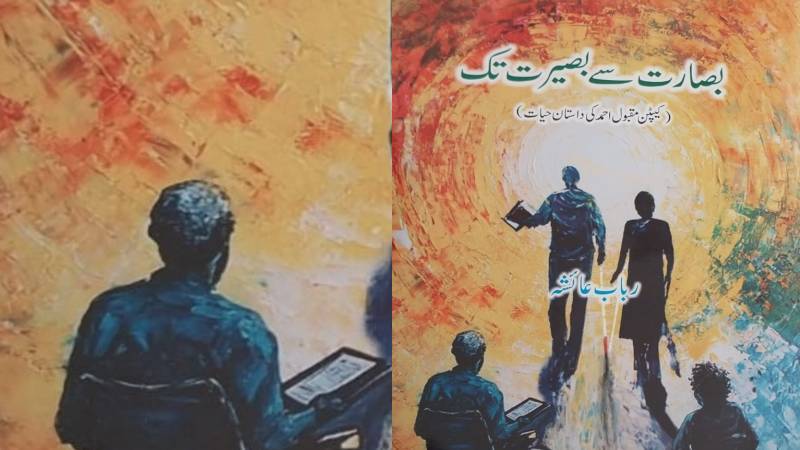
Recently, I was gifted Basarat Say Baseerat Tak and am duly honoured to review it. The book is a simple yet though-provoking narrative that talks about the life, struggles and achievements of Captain Maqbool Ahmed, an individual who had led a life for others. His accomplishment in taking up the cause of the visually impaired in Pakistan and giving them their due respect and rights in society is nothing short of a miracle. Needless to say, Captain Maqbool’s story is incomplete without Dr. Salma Maqbool’s mention – his wife.
The book starts by outlining Captain Maqbool’s childhood and the way families used to live together happily and content with their lives. Captain Maqbool started his education in a ‘taat’ school in the town of Buraywala and enjoyed the large playgrounds, honing his sports skills all along. Later, he spent years hopping from English medium to Urdu medium schools and aced all subjects. He joined the Pakistan army in 1965. Here the writer elaborates on the emotional loyalty of the nation and how households in Lahore weathered the blackouts together.
It is interesting to note the way the author has weaved Captain Maqbools’ narrative with the historical events of the times. The book is marked with anecdotes of Captain Maqbool being lost thrice and returning to his family members. That he went for the small pilgrimage with his brother is yet another event that highlights the intense emotions of an individual whose positive personality outshines all.
As a reader, one is saddened to know that he contracted an eye infection while serving in the army that left him visually impaired later on. The most amazing sentence in the book that shows Captain Maqbool’s complete trust in his Creator is when he says, ‘When I was completely visually impaired, I prayed from the depth of my heart, “Oh Allah! If you are giving me this suffering, then please provide me with the morale to bear it.’” From this day onwards, he appears to be a content, confident person, emoting a cheerful outlook.
The book has an incredibly positive vibe and reinforces the concept that nothing is out of reach if one is positive and sets ambitious standards for oneself
Never do we once see him sad or disappointed or taking help from others for himself. In fact, from here onwards, he involved himself with building organisations for the visually impaired, travelling 56 times internationally, representing Pakistan on international forums, arranging conferences, and supporting his wife throughout his life, among several other things. One of the most unusual achievements is Captain Maqbool’s involvement with research on Retinatis Pigmentosa which was published in science journals of international repute. The husband-and-wife duo made it possible to get visually impaired people to sit for the CSS exams. This was no small feat. Thanks to this, many are now pursuing jobs as government servants on merit.
Basarat Say Baseerat Tak also has a small section that talks about a few personalities Captain Maqbool himself has been impressed with. From differently abled international figures like Rick Henson, Fita Yasi Ro, Pedro Zorita to national ones including Dr. Fatima Shah, Saima Niaz, Captain M. R. Malik, one gets to know of the work of these able individuals who reached great heights and worked or are working relentlessly for handicapped people in Pakistan and abroad.
A separate section on the white cane that most people who are blind or have low vision choose to use around the world brings forward some hilarious mention of what people think it can be used for. The white cane has become an internationally recognised symbol of blindness and low vision but sadly in Pakistan, a lot of people are still unaware of it.
One is also introduced to some brave women like Rabail Pirzada who, despite being visually impaired has authored a book. Then there is mention of Shazia Iqbal who has learned a lot from Darakshan, the organisation set up by Dr. Salma Maqbool and currently run by Captain Maqbool.
Overall, the book has an incredibly positive vibe and reinforces the concept that nothing is out of reach if one is positive and sets ambitious standards for oneself. It also reiterates that just like Captain Maqbool, one’s life needs to have an ambition to help others, and nothing will stop you from being successful.
All credit goes to the author who has brought to life so many personalities with a positive outlook and one keeps wondering how we can be so ungrateful when we have been granted so much. It is a must-read and one that is sure to make you self-reflect.

